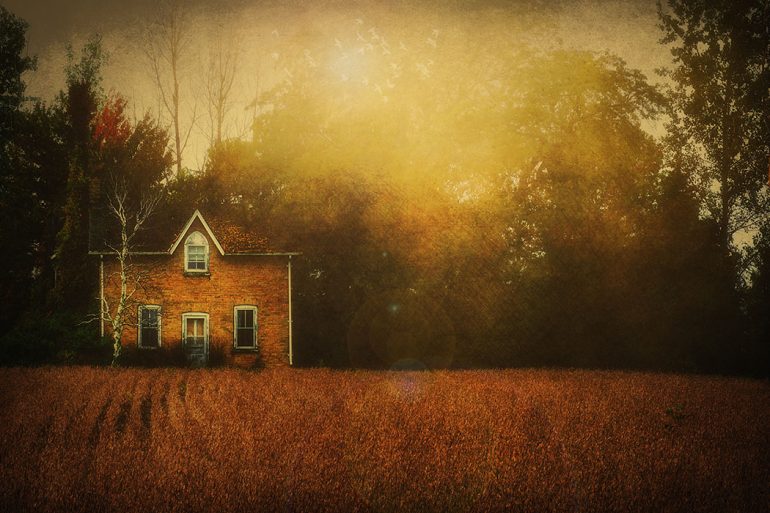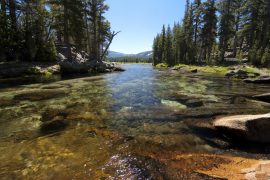I haven’t always been a farmer. But since I’ve spent the last year in Pittsburgh learning how to plant, harvest, and care for fruits, vegetables, and herbs, I feel justified in referring to myself now—at the very least—as a farmer “in progress.” And maturing in my identity as a farmer has meant a number of things for my life practically: it’s meant that I have begun to grow my own food, I stay away from fast food as if my life depends on it (because it does), and I now eat and enjoy things I never had before (who knew Swiss chard is so tasty or that churning a cauldron of apple butter is such a joy?). Farming has not only changed how I make practical decisions, but how I also think about the universe and humanity’s place within it. And today, I’d like to share with you how I have begun to appreciate creation as my home; and how, through farming and the study of ecology, I now think of, and interact with the One who created “the heavens and the earth” (Gen. 1:1).
Ecology is the study of organisms’ relationship to each other and to their environment. More specifically, the term was coined from the Greek word for “house” (oikos); so, in some basic sense, ecology is the study of humanity’s home, which, of course, is the earth. Now pointing out that the earth is our “home” may seem trivial. But I would think that for many people, especially for those of us in the so-called “Western” world, we may not often feel at home, and in fact sometimes may feel like strangers in a strange land (Ex. 2:22), or indeed, a strange universe. For in one sense, the advancement of modern scientific knowledge may be thought of a series of discoveries that have led to an overall sense of our homelessness in the cosmos.
This sense of homelessness is in part due to what is known as the Copernican Revolution, a series of discoveries whereby astronomers demonstrated that it is the sun, and not the earth, that is at the center of our solar system. And of course, cosmology now tells us that not only is the earth not at the center of our solar system, but that our solar system is not even at the center of our solar neighborhood. Furthermore, we now know that our solar neighborhood is not at the center of the Milky Way Galaxy, the Milky Way Galaxy is not at the center of the universe, and that that the universe may not even have a center at all!
If you feel bewildered trying to think about all of this, you’re not alone. Indeed, many of modern cosmology’s discoveries are probably, in some sense, impossible for a human mind to grasp. For, of course, mathematics dictates that the universe is estimated to be about 14 billion years old, but how does such a fact even make sense given our limited experience as human beings? Quite simply, it doesn’t. And so when I began to understand some of the lessons of modern cosmology, along with those of biology, chemistry, geology, physics, and neuroscience, I came to feel that I inhabited a strange and alien universe in which nothing was stable, secure, or what it seemed. Because what does it mean to be a product of chemical reactions, genetic drift, subatomic events, or any number of forces that I can barely comprehend?
I felt homeless, for I had become disenchanted with a world that seemed too huge, too complex, and too messy for me to understand, much less inhabit with any sense of real belongingness. To be clear, my parents had raised me to believe that the earth is a place of beauty, wonder, and inherent goodness. And as such, I often enjoyed climbing trees as a child, I indulged in fistfuls of mulberries when I could, I enjoyed the feeling of rain on my skin, I admired the flight of dragonflies, I stood in awe of the ocean, and I often loved gazing at the stars. But despite these experiences, and my belief in the universe’s goodness, I eventually grew into the unshakable feeling that somehow I was not at home here.
My sense of homelessness was worsened by the fact that I am, in many ways, inescapably a product of Western culture. This culture attempted to indoctrinate me with the idea that nature is merely a commodity—a thing to be controlled, subdued, and not inherently good in and of itself at all, but only profitably good. What I mean is that it sought to instill in me the idea that nature is not my home, but a collection of objects meant to be used for my benefit. And so in this worldview, animals are for eating, land is for building, and the earth’s minerals are for burning because nature is valuable only insofar as humans are able to manipulate and devour it. And here I think of a character in Daniel Quinn’s novel Ishmael, who sums up this idea, exclaiming that the world “belongs to us and we can do what we damn well please with it” [ref]Quinn, Daniel. Ishmael: An Adventure of the Mind and Spirit (New York: Bantam Books, 1995), p. 161; italics original[/ref].
And of course, we’ve done just that: we’ve poisoned ourselves with plastics, toxins, and harmful synthetic foods; we’ve polluted the air, caused potentially disastrous climate changes, created oil spills, leveled rain forests, cruelly mass-manufactured animals for meat, contaminated fresh and ocean waters, made nuclear waste, destroyed topsoil, caused the extinction of countless animal and plant species, and we are in the process of bringing about the extinction of countless more. And so here St. Paul’s words in Romans take on obvious meaning for me when he speaks of the whole of creation groaning in pain (8:22), groaning because humans have exploited and raped the earth. But how are to understand all of this? And what connection does our disenchantment with the world, and our sense of homelessness, have to do with our abuse of the world? I myself only began to understand the connection between these two things when I began to tend a little three acre farm in the Pittsburgh, PA neighborhood of Garfield.
In August of 2012, I accepted a part-time pastoral internship at Pittsburgh Mennonite Church, and in conjunction with that internship, I also accepted an internship at Garfield Community Farm. This, despite having no experiences with gardening or growing anything aside from helping my mom plant a few flowers throughout my childhood! But I learned quickly to love the farm; for under the guidance of the other two staff at the farm, John and Cornelius, I found their passion for growing food and caring for the neighborhood of Garfield to be infectious. Furthermore, I was quickly drawn to the fact that these two were not just concerned with producing food from the earth, but caring for the earth itself—that the earth’s value was not found not only in its ability to produce food—but also somehow that it had inherent goodness. In other words, their approach to creation reminded me of what it was like to be a child again, and have the stars astonish me. Except in this case, I wasn’t wondering about distant suns and planets, but about the small, fantastic ways that zucchini ripen, compost decays, mushrooms fruit, cilantro seeds emerge, or how the many types of life forms work with each other to bring forth abundance and beauty.
It is the last item in particular (that is, the mutually beneficial relationships between plants, animals, fungi, and insects) that has helped re-enchant the world for me, allowed me to overcome my feelings of homelessness, and to accept the size and complexity of the universe this year. For what I have experienced, most fundamentally through farming, is a sense that the universe, as God declares in Genesis, is good. Creation is good. And most fundamentally, the universe is good because it is created, that is, it is a gift from God. And it is a good gift in all of its diversity and abundance; as Genesis emphasizes, God is the fundamental source of the vegetables, fruits, and trees “of every kind” (1:11), sea creatures and birds “of every kind” (v. 21), and land-dwelling creatures “of every kind” (v. 24). So what I think we are seeing in the creation narrative is an affirmation of the earth’s biological variety and complexity—the authors of Genesis are telling us that it is intrinsically good that life is made up of many different shapes, sizes, colors, abilities and forms.
In much the same way, I think we find biblical affirmation in Genesis 11 not just for biological diversity, but for human cultural and ethnic diversity as well. Take, for instance, the myth of the Tower of Babel in which all the peoples of the earth are said to have spoken one language, meaning that they were of a single people and culture; and out of their desire to “make a name for themselves” (11:4), this single culture sought to build the greatest and tallest tower in the world. What does God do in response to this? God could have responded to this event in any number of conceivable ways, but what God does is confuse their language and scatter them across the earth. That is, Genesis’ writers envision diversity as divinely intended! So as one writer puts it, God undoes humanity’s attempt at “imperial monoculture [that is, a culture of one] in favor of… a dispersed, tribally diverse humanity” [ref]Myers, Ched. “From Garden to Tower: Genesis 1-11 as a Critique of Civilization and an Invitation to Indigenous Re-Envisioning” in Buffalo Shout, Salmon Cry: Conversations on Creation, Land Justice, and Life Together, ed. Steve Heinrichs (Harrisonburg, VA: Herald Press, 2013), p .117; brackets added[/ref].
But what does any of this have to do with farming or the natural world? One of the most important lessons I learned farming this year is that crops are most often the healthiest and most beautiful when different types of crops are grown together. Indeed, from my very first day on the farm, the importance of what are known as “polycultures” was emphasized. One can best understand what a polyculture is in contrast to what it is not; so what it is not is a monoculture, which refers to the practice of planting a single plant or crop variety over a large space. No doubt, we are all familiar with the phenomenon of corporate monoculture farms, which often span up to hundreds or even thousands of acres, and consist of a single crop type, such as corn, soy, or a grain of some kind. Polycultures, on the other hand, are much, much smaller than monocultures, are made up of two plant types or more, and often are grown to mimic plant communities that occur naturally without human intervention in the wild.
But why prefer polycultures to monocultures? It is because, as Western society is slowly realizing, planting a single crop, tearing it out, and then replanting the same crop year after year depletes and ultimately destroys soil, and often requires the large-scale usage of environmentally dangerous pesticides and herbicides to keep insect and weed populations under control. In other words, monocultures are a text-book case of “unsustainability,” that is, something that cannot be practiced for long because the earth can only sustain such treatment for only so long! Polycultures are a way to work with the earth’s natural processes rather than against those processes—it is a way to think and live sustainably. And so, drawing on the Tower of Babel story, I think it teaches us that the human drive to overpower and work against the world into producing, say, just corn or soy, is not just a bad idea practically, but that its unbiblical. What I mean is that we find divine affirmation of diversity in Genesis, and that, therefore, when we humans reject the world’s natural abundance and variety, we are operating on the belief that we can improve upon a world that is good, “but apparently not good enough for us” [ref]Myers, Ched. “From Garden to Tower: Genesis 1-11 as a Critique of Civilization and an Invitation to Indigenous Re-Envisioning” in Buffalo Shout, Salmon Cry: Conversations on Creation, Land Justice, and Life Together, ed. Steve Heinrichs (Harrisonburg, VA: Herald Press, 2013), p. 112[/ref].
Now of course, I should make it clear that I am not advocating that humans give up all of their technologies and return to the Stone Age; nor am I arguing that everything that occurs in the natural world is good with exception (for there are, of course, tornadoes, hurricanes, and earthquakes, cruelties inflicted on animals by other animals, and more). Instead, what I mean by saying that the world is good is that, as the psalmist pronounces, “the earth is full of [God’s] unfailing love” (Psalm 33:5). Explaining this idea, theologian Alexander Schmemann writes:
All that exists is God’s gift to [humanity], and all that exists to make God known to [humanity], to make [humanity’s] life communion with God. It is divine love made food. . . . [God] makes all creation the sign and means of God’s presence and wisdom, love and revelation: ‘O taste and see that the Lord is good.’” [ref]Schmemann, Alexander. For the Life of the World: Sacraments and Orthodoxy (Crestwood, NY: St. Vladimir’s Theological Seminary Press, 1973), p. 14[/ref]
I think what Schmemann is standing witness to here is to wonder, wonder before the fact that the earth not only exists at all, but that it also is delightful, beautiful, and abundant for humanity! And here I think of the fact that the Genesis has it that after God creates the world in six days, he rests and takes pleasure in the seventh day. God doesn’t keep working. God doesn’t seek to keep improving the world by building a giant tower. No, God intentionally enjoys the hugeness, diversity, and complexity of the universe. The first sentence in this paragraph needs something.
Ultimately, then, what I think Genesis is trying to tell us is that because creation is good we should (1) to enjoy it, (2) be thankful for it, and (3) to take good care of it! For if one is given a wonderful gift, but then one is neither grateful for it, nor takes care of it, then one has in truth rejected that gift. So for me, learning how to farm was my way last year to learn how to accept and be grateful for the gift of the universe, and my place in it. And I know do feel as though I have a place in it. I have a place because I have been able to truly appreciate and enjoy the literal fruits of the earth as I have harvested honeysuckle, planted garlic, foraged for wild oyster mushrooms, and picked gooseberries. Through farming, I have rediscovered a feeling of at-homeness on earth, that the earth is a gift to humanity. But not a gift to be abused, not a gift that “we can do what we damn well please with”; rather, I have rediscovered it as a gift to be cherished and nurtured—a gift to work with, and not against.
And so, in closing: yes, the universe is unfathomably large and complex. Yes, I will never grasp how every polyculture works, all of the relationships between the world’s many life forms, or what it truly means to inhabit a universe without a center. But I’m able to live with that now. It is enough that our little corner of the universe is profoundly good, abundant with life, and worth delighting in, and not despite, but because of its mystery. For in accepting mystery, we open ourselves to wonder, and in opening ourselves to wonder, we allow ourselves to love and be grateful. Because ultimately, humanity’s many attempts at building so-called “Towers of Babel” (whether those “towers” be monocultures or something else dangerous and unsustainable), always represent humanity’s inability to accept the goodness of the gift we already have. It is an inability to wonder when we only think of the universe as something to consume. It is an inability to accept mystery, and the forces larger than we can understand that pattern our world.
Permaculturist Dave Jacke writes, “Truly, it is difficult to comprehend the hidden powers that weave through and synchronize our lives” [ref]Jacke, “Preface”[/ref]. I know this is true in my own experience. For when I try to track and take stock of all the ways in which I have affected others and been affected by them, I soon get lost in a web of causes and effects that are beyond my ability to comprehend. Such is the way with nature, and such is the way with God. We embedded in a web of contingencies and complexities that extend beyond what we can fathom. Creation is a mystery, a wonderful mystery.





